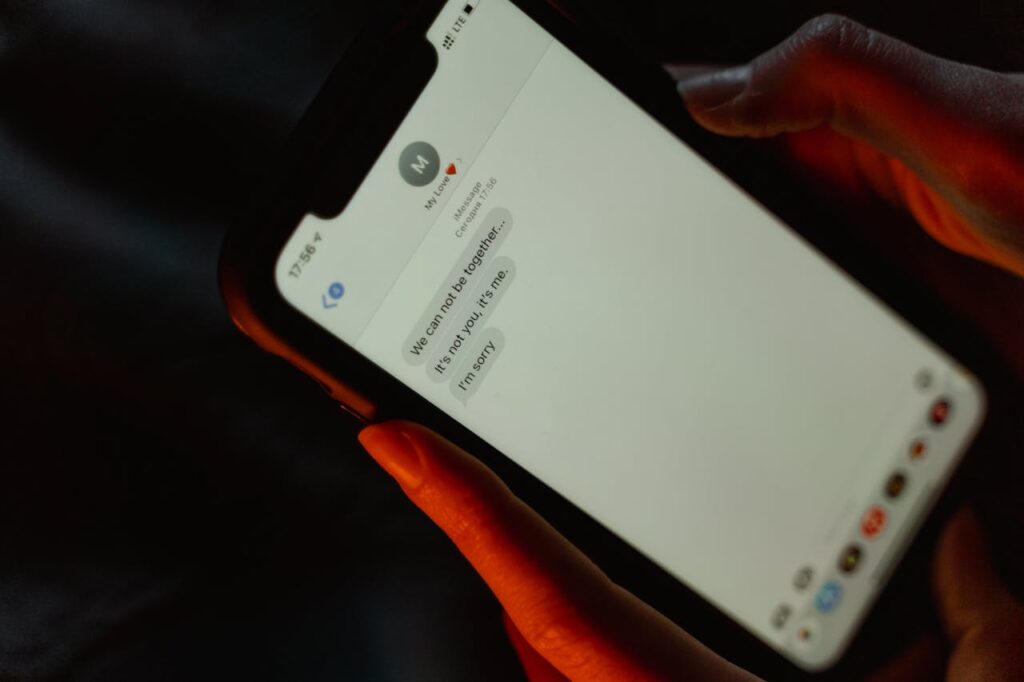Teens often experiment with boundaries, but not everything that feels harmless is actually legal. From copying songs to stretching the truth on apps, some everyday habits can cross serious lines. The law doesn’t always keep up with tech or teen culture, but when it does, the results might surprise you. Whether it’s about protecting privacy, intellectual property, or personal safety, these 12 actions might seem minor but could have unexpected consequences. Here’s what every teen should know before they get into unintentional trouble.
1. Screenshotting Private Messages

Taking screenshots of someone’s private texts or DMs without permission might feel harmless, but depending on how it’s used, it can be illegal, especially if those messages are shared online to shame or embarrass someone. In some cases, it can fall under privacy violations or even cyberbullying laws. Teens often share receipts for drama, but it’s not always just gossip. Think twice before saving or sending someone else’s private words without their consent.
2. Sharing Netflix Passwords

It might seem like no big deal to share your login info with friends, but streaming platforms’ terms of service say otherwise. While enforcement is inconsistent, sharing passwords technically violates user agreements and, in some states, could be considered theft of services. Teens often think of it as a kind gesture or simple hack, but it’s one that companies are cracking down on more every year. The free show binge might come with hidden legal costs.
3. Downloading Music Without Paying

Pirating music through unofficial websites or file-sharing platforms might seem like a thing of the past, but it’s still happening, and still illegal. Teens might not realize that even one illegally downloaded song is considered copyright infringement. While the chances of getting caught are low, the legal penalties can be harsh. Music artists and platforms have pushed for stronger protections, and laws back them up. Streaming may be easier, but pirating still carries risk.
4. Using a Fake Name Online

Creating a fake social media profile under a celebrity’s name or making a parody account of a friend might sound funny, but it can break impersonation and fraud laws. Depending on how it’s used, especially if it causes harm, it may lead to legal consequences. Teens often play with online identities without considering the bigger picture. It’s more than a prank, it could be seen as misrepresentation or even harassment in extreme cases.
5. Trespassing for TikToks

Jumping fences or sneaking into abandoned buildings for viral videos might get likes, but it can also get you charged with trespassing. Private property laws don’t make exceptions for social media clout. Many teens view these adventures as harmless fun, especially if they’re “just looking around.” But whether it’s a rooftop, mall, or construction site, entering without permission could result in fines, arrest, or worse, especially if someone gets hurt while filming.
6. Riding a Bike Without a Helmet

In many states and cities, it’s illegal for minors to ride bikes without wearing helmets. While the rule varies depending on local laws, teens often ignore it, especially on quick rides. But if an accident happens, not wearing a helmet could lead to a ticket or even affect insurance and liability. More importantly, it’s a serious safety issue. Following the rule protects your head, and keeps you on the right side of the law.
7. Recording People Without Consent

Secretly filming a classmate, teacher, or even a stranger in public might seem like fair game, especially for content. But in many states, recording someone without their knowledge or permission, especially in private settings, is illegal. Consent laws vary, but when audio is involved, the risk goes up. Teens should be aware that what feels like a casual post could cross the line into serious privacy violations and even lawsuits.
8. Skipping School Without a Valid Excuse

Skipping class might feel like a personal choice, but it’s actually illegal in most places for minors. Truancy laws hold both students and parents accountable for regular attendance, and repeat offenders can face court involvement. Teens often view ditching school as no big deal, especially if it’s just once or twice, but the law sees it differently. Chronic skipping can lead to fines, detention, or mandatory counseling. It’s not just about grades, it’s about the law.
9. Spray-Painting Anything Without Permission

Even if it’s a cool mural or a quick tag, spray-painting someone else’s property without approval is considered vandalism. Teens might think street art is edgy or artistic, but the law typically doesn’t distinguish. Whether it’s a sidewalk, mailbox, or wall, it’s still property damage, and often a criminal offense. Some cities do offer legal spaces for art, but unauthorized graffiti can lead to fines, arrest, and even a criminal record.
10. Shoplifting as a “Dare”

Daring someone to steal candy, accessories, or makeup may seem like a typical teenage challenge, but it’s theft, plain and simple. Teens might think of it as a joke or harmless rebellion, but shoplifting is a criminal act with real consequences. Stores often press charges regardless of the item’s value. Getting caught can result in arrest, fines, and even probation. It’s not worth the rush or the peer pressure, legal trouble lasts longer than any dare.
11. Lying About Your Age on Apps

Signing up for social media, dating platforms, or online services using a fake birthdate is common among teens, but it’s also a violation of terms and, in some cases, federal law. COPPA (Children’s Online Privacy Protection Act) sets strict rules for users under 13. Teens may not realize that platforms are legally required to protect kids’ data, and lying to get around age limits can raise red flags. Companies are now cracking down harder on age fraud.
12. Cheating on Exams Using Devices

Using phones, smartwatches, or AI tools to get answers during tests might feel clever, but many schools treat it as academic fraud, and in some districts, it’s actually a legal offense. Cheating can result in suspensions, expulsions, and permanent marks on academic records. If devices are misused on standardized tests, legal consequences could apply. Teens often think digital help is just bending the rules, but schools and the law treat it as breaking them.


